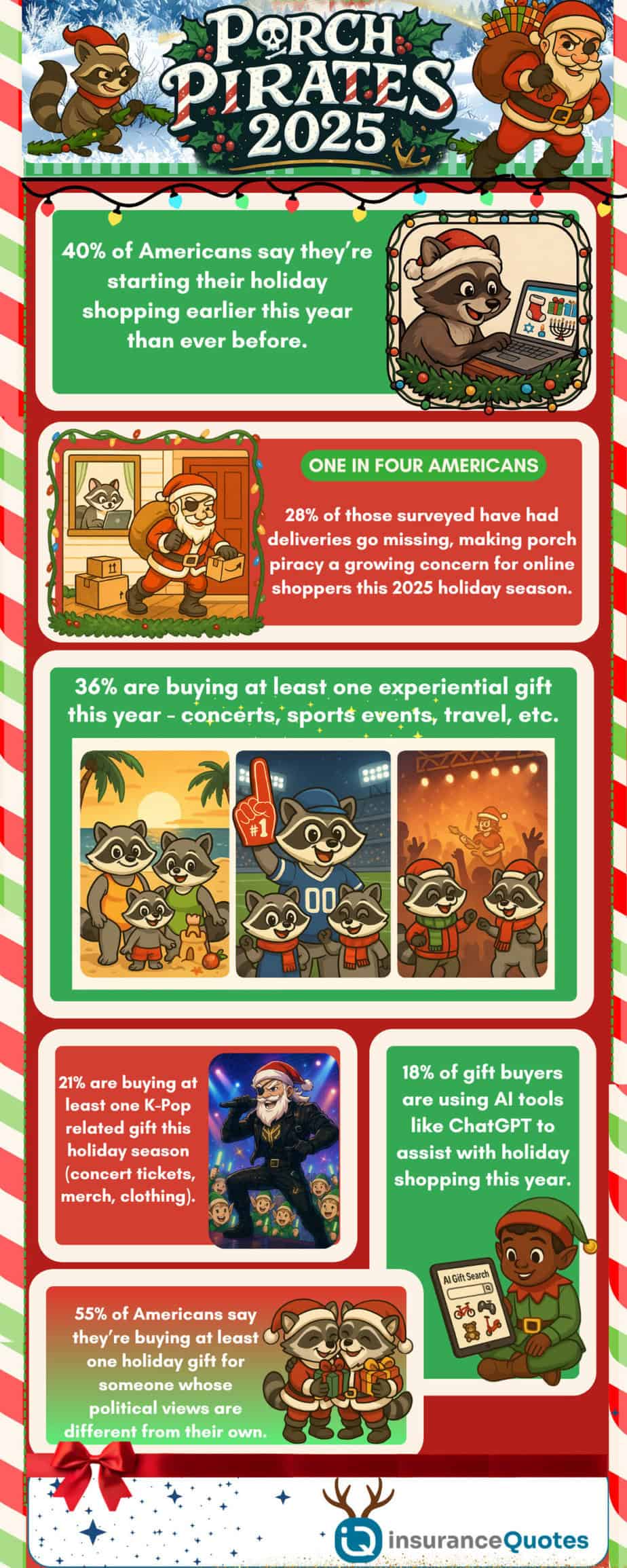Porch Pirates 2025 Holiday Shopping Trends
By Michael Giusti
Estimated reading time: 10 minutes
With the country as politically divided as it is, there is still one issue can bring people from different sides of the political spectrum together – the threat of porch pirates.
Each year, InsuranceQuotes.com partners with SSRS to survey people on their experience with package theft, along with the latest holiday shopping trends for this season of inflation, AI, among other timely factors

According to this year’s survey, 28% of Americans say they have had a delivered package stolen from their porch, doorstep or building lobby. And while that is more than a quarter of all respondents, it is a bit better than two years ago, when 31% of people responded that they were victims of porch piracy.
Among the youngest respondents, however, porch piracy was a much bigger problem, with 41% of 18 to 29-year-olds reporting having a package stolen, compared with just 14% of respondents older than 65.
And while the country may be divided politically, holiday shopping will be bringing many people together. According to our survey, 55% of respondents said they will be buying at least one holiday gift for someone whose political views are different from theirs.
People in the middle-income brackets – those earning between $75,000 and $100,000 — were most likely to say they were buying gifts for people with different politics, with 70% saying this applied to them. Political independents were the most likely to say they will be shopping for people whose politics differed from their own, with 59% saying yes, while Democrats were slightly less likely to say yes, with 51% saying this applied to them.
Regardless of political party, most people said they were feeling the financial pinch this holiday season, with 60% of respondents saying that due to rising prices, they’re scaling back on their holiday gift giving this year. The highest earning respondents seemed more insulated from prices, with only 51% of respondents earning more than $100,000 saying they were scaling back, compared with 65% of respondents earning $50,000 or less. But even among those earning between $75K-$100K, 64% responded that the high costs of goods is causing them to limit their holiday shopping.
Financial worries make some sense, with the Bureau of Labor Statistics reporting that inflation is up 3% compared with last year, all while the future of the newly imposed tariffs sits in front of the Supreme Court for review.
A reliance on artificial intelligence was a bit of a holiday shopping trend, but it differed widely by age. Among all the respondents, 18% say they are using ChatGPT or another similar AI tool to assist with their holiday shopping this year – a spike when compared with 13% last year.
But that trend didn’t hold among the older shoppers, with only 5% of respondents older than 65 saying they intend to use AI for their holiday shopping. There was a gender divide when it came to AI as well. Men in the survey were more likely than women (21 percent compared to 15 percent) to say they would use the AI tool to assist their holiday shopping.
Pop culture emerged as one of the drivers of holiday gift giving – specifically K-Pop.
Among our respondents, 21% said that, this holiday season, they’re buying at least one K-Pop-related gift, such as concert tickets, merchandise, clothing, etc. The youngest respondents were the ones most drawn to K-Pop, with 27% saying they planned to buy a K-Pop-related gift, compared with just 18% of those aged 50 to 64.
It is interesting to see the draw to pop-culture-inspired gift giving. A similar trend held true last year, with 8% of respondents said they were planning to buy a Taylor Swift-related gift, though the higher number this year suggests K-Pop may have a deeper gift-giving appeal.
Gifts this year don’t just include things that fit under the tree. This year, 36% of respondents said that, this holiday season, they’re buying at least one experiential gift (such as concert tickets, a sports event, travel, etc.). That’s a big jump from 2023 when only 28% said experiences were going to make up part of their gift giving.
This year, the highest earning respondents were the most likely to say they were gifting experiences, with half of respondents earning more than $100,000 saying they planned to buy at least one experiential gift, compared with just 33%, or about 1 in 3, of respondents earning less than $50,000.
Giving experiences has been growing as a trend for years now.
Our survey also suggests that people won’t be waiting to do their shopping, with 40% reporting that, this year, they’re starting their holiday shopping earlier than ever.
That trend makes some sense, especially with United States Postal Service timelines making shipping take longer than it has in years past.
Protecting Holiday Gifts
Shipping experts suggest a few best practices to keep porch pirates at bay this holiday season.
The first, most common suggestion is to know what is coming and when. Alisa Carroll, an Amazon spokeswoman, points out that tracking packages in real time means you can be at home when they are delivered and you can get them inside as soon as possible. The less time an item spends on the porch is less time a thief has to swipe your gifts.
Most major retailers offer customers the opportunity to offer hints or suggestions to the driver on where to best leave the package. Suggesting the best place to tuck a package away on or near your porch can keep the package out of sight and make it a less tempting target.
“We train our drivers to leave packages out of sight whenever possible,” said UPS spokesman Jim Mayer.
Even better than suggesting a bush or potted plant to tuck the package behind is to leave a secure location on the porch for drivers to deposit the package. There are self-locking drop boxes available for purchase that homeowners can install on their porches that drivers can tuck the packages into to keep them away from thieves.
Another option Mayer points out is that many shippers offer alternative locations customers can have their packages delivered to. Something like a UPS Store works as a pickup location, and other retail locations also volunteer to accept deliveries on behalf of customers, who can then come pick up their package just by showing their ID. Amazon even has a network of delivery lockers across the country people can access at all hours of the day.
Some carriers in some locations even have programs where they allow customers to provide drivers with a one-time-use remote code that allows the driver to open their garage door and leave the packages within the safety of the locked garage.
Simply having a visual deterrent goes a long way toward preventing package theft, as well.
“Even just having a highly visible camera that looks intimidating upon approaching can help keep thieves away and your home or property secure,” said Jeff Peel, CEO of security device maker Tactacam.
If the gift doesn’t come in a package, that doesn’t mean there isn’t a way to protect it, too. Experiential gifts might benefit from some insurance.
Some ticket marketplaces sell stand-alone coverage for the events they are selling.
But if the gift is a bit more elaborate, a full travel insurance policy might be in order. Travel insurance reimburses you for non-refundable expenses if a trip has to be called off due to unforeseen reasons. And if the gift was an expensive out-of-town concert, a travel policy might make sense. Buyers just need to declare the cost of the tickets when they are purchasing the policy as part of their trip so it can be included in the coverage.
Recovering From Piracy
One of the most heartbreaking things about porch piracy is that once the package is successfully delivered to a porch or a mailbox, the package is now exclusively the responsibility of the homeowner.
That doesn’t mean there isn’t recourse if a package is stolen, though.
The first thing to do if a package turns up missing is to check to see if it is in fact missing after all. A good first step is to check with the carrier for proof of delivery. Most carriers take pictures of where they left the package, and those pictures can show if the package could have just been tucked away somewhere creatively. It might just be well hidden behind a potted plant.
Next, check with family members. A loved one could have seen the package and then brought somewhere in the home you didn’t think to look.
Next, experts suggest checking with neighbors. The package could have been delivered to them by mistake, or they could have seen the package sitting out and exposed, and they might have picked it up for you to keep it out of the watchful eyes of a porch pirate.
If none of that works, experts highly recommend having some kind of video surveillance.
“App-connected cameras like DEFEND 360 give people instant eyes anywhere packages are being delivered: whether that’s on the porch, at the end of a driveway, or at a gate,” Peel said.
If the package is truly missing, it is time to report it to the carrier. While the carrier isn’t legally responsible for the package once it is left on your property, they can help troubleshoot and give you the paperwork to file any necessary claims if it comes to that.
The next step is to report the missing package to the retailer. Again, while a stolen package is not their legal responsibly, many retailers will offer refunds or replacements as a good will gesture to keep a loyal customer.
If the package was truly stolen, it’s then time to report the theft to the police. While it is highly unlikely the police will spring to action to solve a single petty package theft, it is important to file a formal report anyway, so they can know if there is a bigger trend of thefts in the area. It is also important to have a formal police report if you have to file an insurance claim.
Speaking of trends in an area, for their part, UPS is fighting back against chronic porch piracy using AI. They are using big data and machine learning to compile areas with regular package thefts so they can flag high-risk delivery locations.
If the item was particularly valuable, a homeowners or renters insurance policy would protect it from theft. The problem with this route, however, is the deductible. Many homeowners policies have deductibles in the several hundred and even thousands of dollars, meaning there isn’t going to be much coverage left for a typical package theft.
A final place to look for protection is with the credit card used to make the purchase. Many premium credit cards offer purchase protection, which in many cases includes theft within a certain window of when you made the purchase, meaning porch piracy may be a covered event.
In the end, while porch piracy continues to be an unwanted fixture of modern life, this year’s survey suggests some cautious optimism. Porch piracy is down slightly from years past, and consumers, shippers, and retailers are getting smarter about protecting their deliveries.
Methodology: This study was conducted by SSRS on its Opinion Panel Omnibus platform. The SSRS Opinion Panel Omnibus is a national, twice-per-month, probability-based survey. Data collection was conducted from October 16 – October 19, 2025 among a sample of 1,007 respondents. The survey was conducted via web (n=977) and telephone (n=30) and administered in English. The margin of error for total respondents is +/-3.6 percentage points at the 95% confidence level. All SSRS Opinion Panel Omnibus data are weighted to represent the target population of U.S. adults ages 18 or older.
